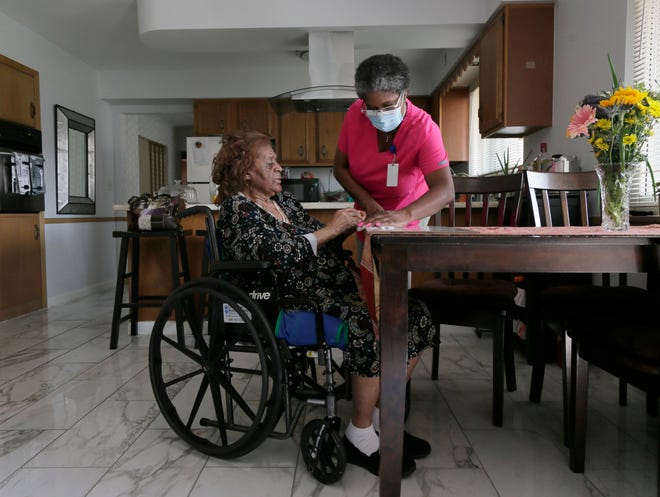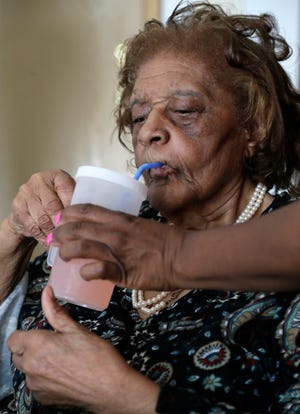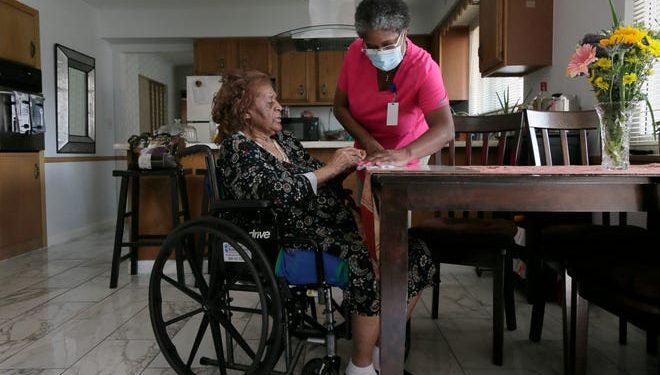
Lula Slayton is a proud girl. A former pastor’s spouse, she attire nicely (a black costume and pearl necklace throughout a latest go to), cares about her coiffure and isn’t shy about telling others what she desires.
“I name her, `boss woman,’” laughs her daughter, Berwick resident Patricia Carson.
Lula is also 84 years outdated, has dementia and makes use of a wheelchair. She will’t get off the bed with out assist.
Residence care in Ohio: Funding boost coming from state, federal governments
Caring for her mom by herself shouldn’t be potential for Carson, 64, who has some bodily limitations of her personal after a latest surgical procedure.

The Ohio Department of Aging accredited Slayton for 71 hours of dwelling well being care every week: 9 a.m. to eight a.m. weekdays and 9 a.m. to five p.m. on weekends.
And Carson is lucky to have an aide (the skilled time period is direct-service supplier, or DSP) for 40 hours every week. Melinda Howlett spends time with Slayton from 9 to five on weekdays.
However for almost a yr now, Carson has not been capable of finding somebody to fill the gaps on evenings and weekends.

She spends hours with a spreadsheet of supplier names, calling fruitlessly. She has realized to be upfront, telling the supplier her mom has advanced-stage dementia and bodily points.
“Most of them don’t need to spend the time and even come out,” Carson mentioned. “On common, it takes me 14 calls simply to get one company to observe via and ship somebody out, and even then, you don’t have a stable deal. I had somebody renege simply yesterday.
“I’ve cried rather a lot.”
Residence well being aides in brief provide nationwide
Round Ohio and the nation, Carson’s predicament is frequent. Amid an elevated demand for dwelling well being care, DSPs are low-paid and in brief provide.
Based on PHI, a national direct-care advocacy group, from 2009 to 2019, the median pay for the greater than 155,000 DSPs in Ohio rose lower than 2%, from $12.61 an hour to $12.80.
That meant that regardless of working full-time jobs, 20% of DSPs lived in poverty and 48% acquired some type of authorities help.
Howlett, who cares for Slayton, is paid $11 an hour.
“The work is mostly undervalued,” mentioned Stephen McCall, an information and coverage analyst for PHI. “Now we have traditionally under-invested in these employees, and now we’re paying the value.”

McCall mentioned he believes a part of that equation is that girls and other people of shade are over-represented within the DSP subject. In 2019, almost 90% of Ohio’s DSPs had been girls (89%) and 39% had been non-white (total, Ohio’s non-white inhabitants was 23%).
The COVID-19 pandemic solely exacerbated the problem, as many DSPs left the sector, not keen to danger an infection in folks’s properties for such low wages. Nationwide estimates range as to what number of employees left, from 5% of the workforce to as excessive as 22%.
The consequence?
“Ohio is experiencing the worst home-health-care supplier disaster in its historical past, that’s the place we’re at,” mentioned Hilliard resident Kim Kelly.
Coordinating care, managing state paperwork a full-time job for households
She ought to know. Kelly has been advocating — typically loudly — for higher pay and a greater system to assist look after folks like her son, Joe, 33, who first was identified at age 5 with cerebral palsy however later discovered to have a genetic mutation (the situation known as GNA01) meaning Joe can’t communicate or stroll.
“He has the power of a 6-month-old child, that’s my son,” Kelly mentioned. “He wants whole care.”
Even together with her decided involvement find DSPs, Kelly estimated she has had 150 folks come and go over the 28 years she has wanted caregivers. Most keep a few yr, she mentioned, and transfer on.
Now 66 and retired, Kelly mentioned coordinating Joe’s DSPs and accounting for each greenback spent on his care (as required by state companies) is a 40-hour-a-week job.
She is aware of there are many different individuals who battle with discovering care, and other people going with out care.
“Now we have folks unable to get off the bed, sitting in their very own feces and urine for hours on finish as a result of there’s no one there to assist them bathroom,” Kelly mentioned. “They will’t get meals. It’s to the purpose the place some individuals are going to need to go to a (nursing dwelling) facility.”
Advocates and state officers say they’re heartened by the latest announcement that the state and federal authorities will present some aid and maybe a lift in pay.

However they fear will probably be short-term or simply not sufficient of a lift. Whereas private-sector employers can — and have — raised wages considerably to attempt to entice new employees, the DSP subject is sort of totally reliant on legislative intervention.
Pete Moore, president and CEO of the Ohio Provider Resource Association, which represents 177 companies, mentioned the business’s latest recruiting efforts to draw extra employees, “has not made a dent in any respect,” and worries some companies could quickly have to shut due to lack of employees.
Cindy Farson, government director of the Central Ohio Area Agency on Aging, mentioned it comes right down to a scarcity of respect for the career.
“These individuals are woefully underpaid,” she mentioned. “The folks caring for our moms don’t get the respect they deserve, and respect is pay.”

To folks corresponding to Kelly and Carson, it comes right down to fundamental human dignity.
“My son deserves to have a life price dwelling.” Kelly mentioned.
In the meantime, one in every of Carson’s cousins has been staying together with her and serving to with Slayton, however that may’t final perpetually. Carson retains calling potential DSPs and is rising more and more pissed off.
“It’s your mom, you don’t need to put her in a nursing dwelling,” she mentioned. “However I can’t belief the system proper now to maintain my mother. This example is appalling.”

kgordon@dispatch.com
@kgdispatch










